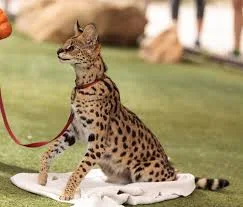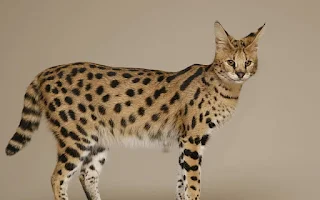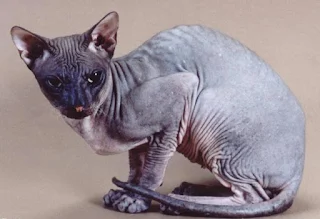Written By Xena
I recently wrote about the most expensive cat in the world.
And now I bring you the TOP 5 for which you will have to set aside a really small
fortune if you want to have them and show your status symbol and prestige.
1. ASHERA CAT ($ 125,000)
It is the most expensive cat in the world.
Not only is its selling price high, but you will also need to have a hefty
wallet to feed it for over 2 decades.
The most expensive are those with
patterns like the snow leopard (a dizzying $ 125,000), the rest are sold for as
little as $ 22,000, and the average price of this breed of cat is $ 28,000.
The
ASHERA is not a purebred breed, because it was created by crossing: AN AFRICAN
SERVAL (like a SAVANNAH cat), an ASIAN LEOPARD (like a BENGAL cat), and a
DOMESTIC DOMESTIC CAT. It is the rarest and newest breed of DOMESTIC CATS. It
is a tall, graceful cat with large, pointed ears, weighing about 30 lbs,
adorned with fur with leopard spots and tiger stripes.
The lifespan of this
beauty is about
25 years.
ASHERA is a
cat that loves to climb, it is friendly, loves children, and it is
possible to train her. It likes to
stay on a heated blanket during the colder
days of the year. If you definitely want to show your status symbol by buying
this beauty, keep in mind that you will have to "stand in line" for
at least 9 months. So whoever loves, let him, love!
2. BENGAL CAT ($ 42,000)
It originated in the 1950s in the USA by
crossing an ASIAN LEOPARD CAT (Prionailurus bengalensis) and a DOMESTIC CAT,
especially the spotted EGYPTIAN MAU for the purpose of researching feline
leukemia. In, physical appearance, the BENGAL CAT is similar to the ASIAN
LEOPARD cat, and in character, the DOMESTIC CAT.
She is muscular, of an
athletic build, of medium size, smaller head, wide, wedge-shaped, rounded,
small ears, wide at the base. Her eyes are very wide apart, oval or light
almond-shaped with a slight slant.
She has muscular legs of medium length with
round and large paws, with the hind legs being longer than the front ones. The
tail is thick, of medium length, tapering and rounding at the tip. The exotic
appearance of this breed is especially contributed by a long, strong, and
muscular body and fur that is short to semi-long, shiny and dense, soft to the
touch with dotted patterns in the form of a rosette or marbled (marbelle)
patterns.
The character of this beautiful cat says that it is a
very active,
agile, energetic, playful, smart, confident, and curious cat.
Most Bengalis
enjoy playing, chasing, climbing, and exploring. These are rare cats that love
water and enjoy playing in the water. In general, Bengalis enjoy the action.
They are a sociable breed, and it is very important that they socialize from an
early age.
3. SAVANNAH CAT ($ 22,000)
The cat breed SAVANNAH was created by
crossing the AFRICAN SERVAL - an African wild cat and a domestic cat.
It is a
relatively new breed of cat, recognized by the International Cat Association
(TICA) in 2012, although it originated much earlier - back in 1986. The
SAVANNAH cat is recognizable by its large, pointed ears and golden, silver, or
black smoke-colored fur, covered with dotted patterns.
Black SAVANNAHS are
monochromatic with possible pale spots visible beneath the black. SAVANNAH is a
spotted cat, and spots can be: oval, round, or elongated dark brown to black. It
has an elongated body with long legs and is almost the same size as any other
large domestic cat.
Unusual physical features such as a long neck, small, elongated head, darkened eyes, and short, thick tail with black rings also give
this breed an exotic look. The eyes have a boomerang shape — brown, gold, or
green (except in kittens — whose eyes are blue) color.
She is very attached to her family and gets along better with people who are willing to play with her. Otherwise, it can become
destructive. So give her plenty of play and lots of solid toys.
She enjoys
interacting with people, children, and other cats, but also friendly affectionate
dogs. If you are attracted to cats with a slightly wild character, then
SAVANNAH is the right choice for you.
4. SPHYNX CAT ($ 3,000)
Cultivation of this breed in its present form began in Canada in 1966 when a domestic cat gave birth to hairless kittens by a spontaneous genetic
mutation.
The new breed was named MOONSTONE CAT (CAT OF THE MOONSTONE) and then
CANADIAN HAIRLESS. Further crossbreeding creates a new breed called SPHYNX.
This breed is recognizable by the fact that it is hairless, ie it has no fur,
but it has a layer of fine undercoat.
In SPHYNX cats, the lack of a mustache is
quite common, and the skin around the muzzle, on the shoulders, and ears, can be
wrinkled. The skin is sensitive to the sun, so before sun exposure, it is
necessary to apply sunscreen with a high protection factor, because otherwise,
burns can occur.
Also, they need to be
wiped frequently and regularly with damp wipes or some other damp cloth so as not to leave sweat stains on the furniture.
Due to their sensitivity to heat and cold, it is best to keep them indoors. It
is also necessary to clean their ears often, as they are prone to the
accumulation of mucus and dirt.
As they do not have fur, it should be borne in
mind that these cats can often be cold. PHYSICAL CHARACTERISTICS OF SPHYNX cats
are: muscular and round body with strong chest, elongated head with high
cheekbones and accentuated chin, very large ears wide at the base, large and
slightly slanted eyes, tail like a whip, narrowed towards the top where their
is sometimes a tufted hair.
The legs are of medium length with oval paws and
long, slender toes, and the hind legs are longer than the forelegs. By the way,
the SPHYNX CAT is: intelligent, curious and playful, talkative and loud, and very
attached to its owner.
They get along well with children, dogs, and other cats
(preferably with other Sphynx cats). They are not recommended for people who
are allergic to cat hair, because, although they do not have fur, they are not
anti-allergic.
5. PETERBALD CAT ($ 3,000)
This breed is native to Russia-St.
Petersburg. It was created in 1994 by an experimental crossing of the
SPHYNKS cat and the ORIENTAL
SHORT-HAIRED breed with the hair loss gene.
The breed is fast becoming popular
throughout St. Petersburg, so this results in the name PETERBALD.
There are
several variations of her fur: completely hairless, fur-like peach skin,
fur-like velvet, as well as their different variants that can change over time.
The fur that a cat acquires at birth can change during the first two years of
life (with a tendency to lose or gain hair).
The characteristics of this breed
are, in addition to the above: long and narrow head with a flat profile, large,
separated ears, almond-shaped eyes (eye color depends on the color of the fur),
wedge-shaped snout, long and strong tail-like a whip, oval paws of medium size
connected toes.
It is this feature that allows them to open doors and hold on
to various objects. Their hind legs are a little longer than their forelegs.
The PETERBALD cat is distinct: energetic, smart, and curious, but also
affectionate, peaceful, and gentle personality.
She is very attached to her
owner and will follow in his footsteps wherever he goes, crawl into his bed, or
sit on his lap. They are very talkative and get along well with other pets. As
they do not have fur,
they need to be bathed regularly. This breed does not
belong to
HYPOALLERGY and is recommended for people prone to allergies.
If you are wondering which of
these MOST EXPENSIVE BREEDS of cats is also the MOST AGGRESSIVE? There are no
rules. It is true that some cats are a little harder to tame than others
(SAVANNAH, BENGAL, AFRICAN SERVAL, SPHYNX).
But they are neither lions, nor
jaguars, nor tigers, and they need discipline, proper care, attention, and
affection. And with the right education, you can turn a tiger into your
"hairy friend".
I'll be writing about MOST
AGGRESSIVE CATS in the next sequel of my BLOG about cats and dogs. In the
meantime, for more information about cats and dogs, visit my YOUTUBE CHANNEL at:
https://www.youtube.com/channel/UCLBiSeK99poMzDuuyvzDUXg
"We have to take care of our pets as for ourselves."














0 comments:
Post a Comment